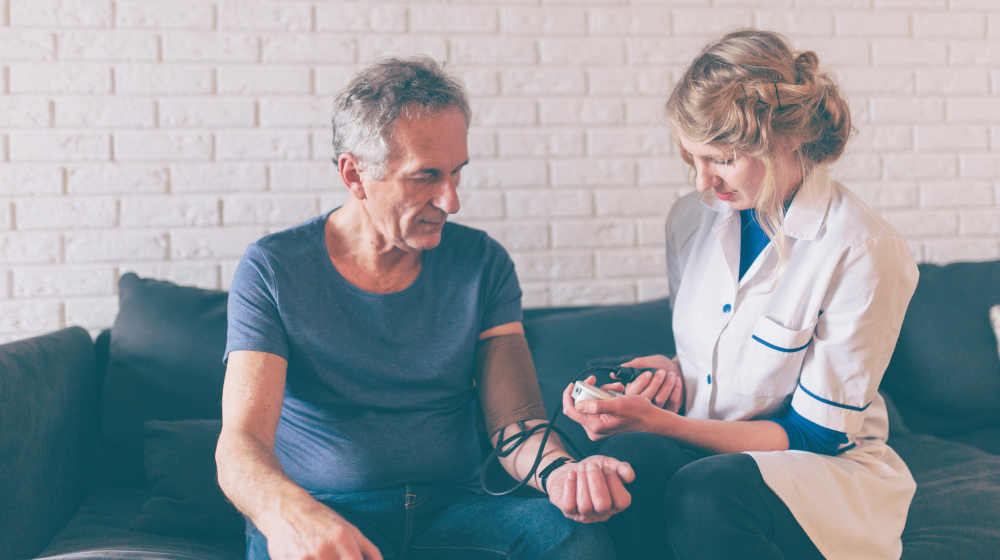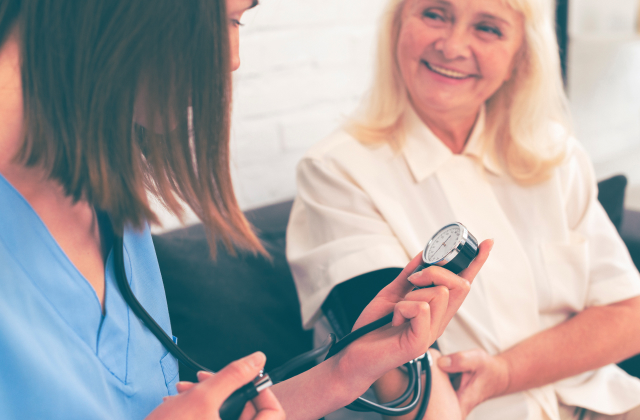Normal Pulse Rate for the Elderly: Understanding Heart Health in Older Adults
![]() This article contains medical information that should be reviewed with a doctor before being applied or used.
This article contains medical information that should be reviewed with a doctor before being applied or used.
As individuals age, monitoring vital signs like pulse rate becomes increasingly important. Understanding the normal pulse rate for the elderly is crucial for assessing their heart health. Today skilled nurses from Angel Care Ink. explore what constitutes a normal pulse rate in older adults and why it matters. This article serves as a general guide to the issue; it’s important to remember that every individual is different and may have varying normal ranges. For a more accurate assessment of your specific condition, consulting with a doctor is advised.
What Is a Normal Pulse Rate?
The pulse rate, or the number of heartbeats per minute, is an essential indicator of heart health. For elderly individuals, a normal resting heart rate typically ranges between 60 to 100 beats per minute (bpm). However, various factors such as medications, fitness levels, and medical conditions can influence this range.
Normal Pulse Rate in the Elderly
As people age, their heart rate can be affected by changes in physical health and the presence of chronic conditions. For elderly individuals, maintaining a pulse rate close to the standard adult range of 60-100 bpm is generally healthy. It’s important to note that individual variations exist, and what’s normal for one person may not be for another.
Normal Heart Rate in Older Adults
Older adults often experience a slight increase in resting heart rate compared to younger adults. This can be due to factors like reduced heart muscle efficiency and the effects of medications. A heart rate around 70 bpm at rest is commonly seen as healthy in older adults.
Normal Pulse Rate for a 70-Year-Old Woman
Women, as they age, might see variations in their heart rate due to hormonal changes and other physiological factors. For a 70-year-old woman, a resting heart rate around 70 bpm is considered normal and indicative of good heart function.

Is 70 bpm Good?
A pulse rate of 70 beats per minute is generally good and within the normal range for most elderly adults. It indicates a well-functioning heart and is often associated with better cardiovascular health.
Factors Influencing Pulse Rate in the Elderly
Several factors can affect the pulse rate in elderly individuals:
- Physical Activity: Regular exercise can lead to a lower resting heart rate.
- Medications: Certain medications, especially those for blood pressure or heart conditions, can alter heart rate.
- Chronic Conditions: Conditions like hypertension or thyroid disorders can impact heart rate.
- Emotional State: Stress and anxiety can temporarily increase heart rate.
- Monitoring Heart Rate in the Elderly.Regular monitoring of heart rate is vital for elderly individuals. It helps in early detection of potential heart-related issues. Devices like smartwatches and medical alert systems can assist in keeping track of the heart rate.
When to Seek Medical Advice
If there are significant changes in an elderly person’s heart rate, especially if it’s consistently above 100 bpm or below 60 bpm without a clear reason, medical advice should be sought. Symptoms like dizziness, shortness of breath, or chest pain accompanying heart rate changes also warrant immediate medical attention.
Conclusion
Understanding the normal pulse rate for elderly individuals is essential in maintaining their heart health. A rate around 70 bpm is typically good, but it’s important to consider individual health conditions and lifestyle factors. Regular monitoring and consultation with healthcare professionals play a pivotal role in ensuring the heart health of older adults.
If you or member of your family needs a home care Angel Care, Inc., New York home care agency here to help, rich us now by phone at 917-507-7500 or by e-mail at info@angelcareny.com.
To learn more about our home care services, contact our caregiving team today at 917-507-7500 or find a caregiver near you.

Becoming a caregiver, whether for an aging parent, a spouse, or a disabled family member, involves not just a personal commitment but also navigating a complex web of legal and financial responsibilities. Understanding these responsibilities is crucial for both the well-being of the caregiver and the person they are caring for. Legal Considerations Power of Attorney (POA) Setup: Setting up a POA is a critical action. This legal document empowers the caregiver to act and make decisions for their loved one, particularly in situations where the loved one is unable to make those decisions on their own. Advance Directives Overview: These important documents, encompassing living wills and healthcare proxies, specify the preferred types of care and end-of-life desires of the individual receiving care. Guardianship Consideration: When a loved one is unable to make their own decisions and there are no pre-existing legal plans in place, caregivers might need to think about pursuing guardianship. This involves a legal procedure through the courts to designate an individual as the official guardian. Estate Management: It's crucial for caregivers to comprehend and handle the estate of the person they're caring for. This includes effectively managing their assets and debts and planning for future inheritance matters. Financial Considerations Budgeting for Care: Caregiving often comes with increased expenses. Creating a budget that accounts for medical expenses, caregiving supplies, and potential home modifications is essential. Navigating Government Aid Programs: Familiarizing oneself with and leveraging programs such as Medicaid, Medicare, veterans' benefits, and Social Security Disability Income is essential for financial assistance. Knowing how to determine eligibility and navigate the application process is crucial. Understanding Tax Consequences: Caregivers need to be informed about possible tax deductions or credits available, like the Dependent Care Credit, which can help reduce financial pressures. Understanding Long-term Care Insurance: It's important for caregivers to familiarize themselves with the coverage details of the care recipient's long-term care insurance, including aspects like home care or nursing home care provisions. Work-Life Balance: Juggling employment alongside caregiving responsibilities presents its challenges. It's vital for caregivers to be aware of their rights, particularly under legislations such as the Family and Medical Leave Act (FMLA). Prioritizing Caregiver Health and Wellness Amidst navigating legal and financial matters, it's imperative for caregivers to also take care of their physical and emotional well-being. Caregivers often face stress, burnout, and financial difficulties. Therefore, reaching out to caregiver support groups, seeking professional counseling, and dedicating time to self-care activities are crucial steps for maintaining their health. Final Thoughts The caregiving journey is fraught with various obstacles, yet through a thorough comprehension and adept handling of the legal and financial dimensions, caregivers can secure top-quality care for their loved ones. Simultaneously, they can safeguard their own well-being. Guidance from legal experts, financial advisors, and caregiver support groups can be tremendously helpful in steering through these intricate challenges. If you or a member of your family needs home care, or if you are looking forward to becoming a caregiver with Angel Care, Inc., a New York home care agency, we are here to help. Reach us now by phone at 917-507-7500 or by e-mail at info@angelcareny.com.

With their extensive experience, the caregivers at Angel Care Inc., a home care agency in New York, understand how creating a nurturing and secure environment in home care settings is essential for the well-being and comfort of those receiving care. Whether it's for short-term recovery or long-term care, the ambiance of a home plays a crucial role in promoting health and safety. This article explores key aspects of fostering a care home environment that feels both safe and homely. How to Take Care of the Environment at Home? The first step in crafting an ideal home care environment is understanding how to care for the environment at home. This involves maintaining cleanliness, ensuring adequate lighting, and reducing clutter to prevent accidents. Regular cleaning and organization can significantly enhance the comfort and safety of the home, making it more conducive to recovery and daily living. Health and safety in the home care environment are paramount. This includes ensuring that the home is free from potential hazards that could cause falls or injuries. Installing grab bars in bathrooms, securing rugs to prevent slips, and making sure hallways and rooms are well-lit and obstacle-free are essential steps in this process. Home Like Environment of Long-Term Care For long-term care, creating a home-like environment is vital for the mental and emotional well-being of residents. Personalizing the space with familiar items like photographs, artwork, and personal belongings can make a significant difference. Comfortable furniture, pleasant decor, and a warm, welcoming atmosphere contribute to making the care home feel more like a home and less like a facility. Safety in the home care environment is not just about physical safety but also about emotional and psychological security. Ensuring that the home is a safe haven where residents feel supported and cared for is crucial. This includes having a well-trained staff who are attentive to the needs of those in their care and a system in place for addressing any concerns that may arise. Advices from Angel Care Inc. on Creating a Safe Home Environment for Working with the Elderly Caring for the environment at home also means considering the sustainability of practices within the home care setting. Using eco-friendly products, conserving energy, and recycling where possible are ways to contribute positively to the broader environment while maintaining a healthy living space. Thus, the experts at Angel Care Inc. have prepared tips on how to create a Safe Home Environment: Eliminate Tripping Risks: Keep pathways free from obstructions and fasten down any loose rugs to avoid falls. Fit bathrooms with grab bars for added safety. Improve Visibility: Enhance the lighting in living areas, corridors, and on stairs to ensure good visibility, particularly during nighttime. Add Handrails for Support: Install handrails on both sides of stairways and along corridors to assist with stability while moving. Bathroom Adaptations for Safety: Outfit bathrooms with anti-slip mats, elevated toilet seats, and seats for showers to increase safety when performing personal hygiene tasks. Adjust Furniture Height: Ensure that chairs and beds are at a comfortable height for easy sitting and standing. Organize for Accessibility: Arrange everyday items within easy reach to avoid overstretching or bending. Install Emergency Response Systems: Set up medical alert systems or emergency call buttons in accessible locations. Kitchen Safety: Use automatic shut-off devices on kitchen appliances and keep sharp objects in safe, reachable places. Regular Maintenance: Keep the home well-maintained, including checking for loose carpeting, floorboards, and ensuring all doors and windows open easily. Educate on Safety Practices: Regularly discuss safety awareness and emergency procedures with the elderly to keep them informed and prepared. The Care Home Environment The care home environment should be a blend of safety, comfort, and personalization. Creating a space that is both functional and homely requires attention to detail and an understanding of the unique needs of those in care. It's about striking the right balance between a clinical setting that attends to health and safety needs and a living space that offers warmth and comfort. In conclusion, crafting an ideal home care environment involves a thoughtful approach to both the physical and emotional aspects of care. By focusing on safety, personalization, and health, home care settings can provide a nurturing and secure space for individuals to thrive.



